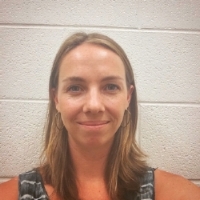I have always loved the idea of working in the policy and research field. As a former teacher of students with deafblindness, I figured out pretty quickly that while I could make a big difference for the students in my classroom, I had very little power to help the students in a school down the street, a school across the state, or a school across the country. I imagined working in the policy field was where I could make the most difference, where I could be a part of the systems change movement. But before I put all my eggs in the proverbial policy basket, I reasoned, I should probably do an internship and determine if this was really the career path I wanted to take. So, I contacted the American Foundation for the Blind (AFB), asked if they were still looking for summer interns, and lo and behold there was one spot remaining. Now, a few weeks after my five-week summer internship has ended, I can say with certainty, my time in the world of policy has only just begun.
While it's called an internship, it felt more like a crash course in politics, policy, research, and everything D.C. Over just five weeks I sharpened my understanding of federal laws and state regulations; I participated in meetings on the Hill, seeing both politicians and policy staff in action; I attended research presentations at a range of conferences that helped me to understand the larger systems and structures in place that affect Americans with disabilities; I was able to participate alongside disability advocacy groups in the fight to vote "NO" and protect Medicaid in the proposed healthcare bill; and, most notably, I spent a lot of time deepening my understanding of Social Security.
I'm going to be honest, up until a month ago, I really didn't understand Social Security. I thought I had a basic understanding of who the social program benefitted, and I had heard, and agreed, with countless other young Americans who complained that "we would never see a dime of Social Security by the time we retire." But after having attended the National Academy of Social Insurance's Demystifying Social Security: 2017 Summer Academy and the Social Security Administration Disability Research Consortium Annual Meeting I realize how uninformed I really was.
As discussed more in-depth in my two part article series, Social Security is one system made up of two funds, providing direct benefits to over 61 million Americans. From retirees and those with disabilities, to children and spouses of the injured and deceased: Social Security provides a foundation of economic security for all. And yes, long-term projections may seem somewhat bleak, but the truth is, the Social Security program is neither broken, nor will it disappear. It is simply a matter of Congress taking action to ensure the solvency of the program. If you too want to deepen your knowledge and understanding of the Social Security Program, Retirement Benefits, or Long Term Projections, I encourage you to read my two-part article on Social Security:
- Social Security Basics: What's It All About?, and
- Social Security: The Long-Term Financial Outlook and Retirement Benefits for All Americans.
I never thought I would find myself so entrenched in the discussion surrounding Social Security, but the deeper I dig, the more I learn, and the more passionate I become about getting involved. If my time in D.C. taught me anything, it is that the voice of the people matters. If you have concerns over loss of Social Security benefits, call your senators and representatives! The Social Security Administration has provided a summary list of provisions that would change the Social Security Program so that it can remain solvent for the next 75 years (you can find that list here: https://www.ssa.gov/OACT/solvency/provisions/index.html ). Social Security isn't going away. Therefore, it is critical that we all stay informed and understand the potential changes so that we can advocate for the protections of benefits that support over 61 million Americans today.
